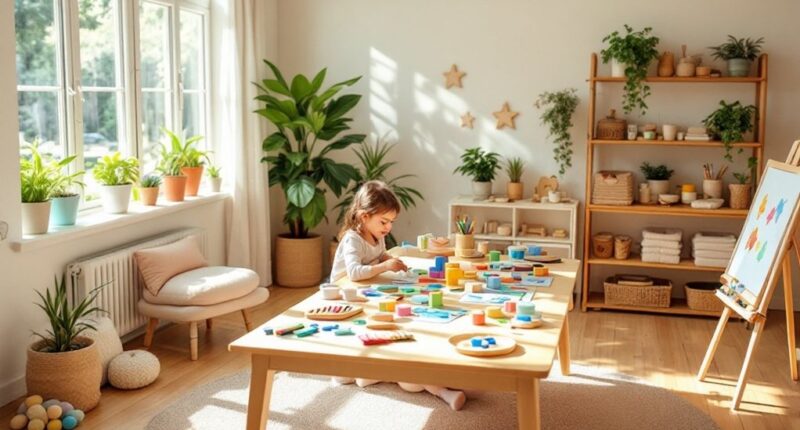Evidence-based memory care activities that effectively support cognitive function include jigsaw puzzles, therapeutic dough manipulation, painting, structured reminiscence sessions, and interactive technology platforms. You'll maximize engagement through sensory integration activities like aromatherapy and music therapy, while practical life skills training maintains functional independence. Virtual reality programs and horticultural therapy provide additional cognitive benefits, with research showing up to 30% slower decline rates through consistent implementation. Further exploration reveals thorough protocols for ideal therapeutic outcomes.

The cognitive decline associated with aging necessitates structured memory care activities that integrate multiple therapeutic modalities to maintain seniors' mental acuity and quality of life. Evidence-based cognitive stimulation protocols, including jigsaw puzzles, word searches, and maze-based exercises, demonstrate measurable improvements in short-term memory retention and information processing speed when implemented consistently within memory care environments. Activities that emphasize failure-free engagement help preserve residents' confidence and willingness to participate.
Structured cognitive activities and therapeutic interventions play a vital role in maintaining mental function and enhancing life quality for aging adults.
Sensory integration therapies represent a critical component of thorough memory care programming, with tactile stimulation activities such as therapeutic dough manipulation and textile threading showing significant efficacy in maintaining fine motor function while simultaneously engaging multiple neural pathways. The incorporation of aromatherapy and music therapy protocols has demonstrated marked reductions in anxiety levels and improvements in mood regulation among dementia patients. Research shows that engaging the five primary senses through targeted activities provides substantial cognitive and behavioral benefits.
Creative expression modalities serve as fundamental tools for maintaining cognitive function, with painting, sculpting, and collage work providing measurable benefits in spatial awareness and executive functioning. These activities, when combined with social engagement protocols such as group music therapy and structured reminiscence sessions, create synergistic therapeutic effects that enhance both cognitive performance and emotional well-being. Trained staff members utilize dementia care techniques to facilitate these creative sessions effectively.
The implementation of practical life skills training, including meal preparation and environmental organization tasks, maintains functional independence while providing cognitive stimulation through sequential processing and decision-making exercises. Horticultural therapy programs offer additional benefits through the integration of physical activity with cognitive engagement, promoting both mental acuity and physical well-being.
Technology-based interventions, including virtual reality platforms and interactive cognitive training programs, represent emerging therapeutic tools that demonstrate promising results in maintaining cognitive function among seniors with dementia. These digital platforms, when integrated with traditional therapeutic modalities such as reminiscence therapy and social engagement activities, create a thorough approach to memory care that addresses multiple domains of cognitive function simultaneously.
The systematic implementation of these evidence-based interventions, coupled with regular assessment of therapeutic outcomes, guarantees ideal cognitive support for seniors experiencing memory-related challenges.
Frequently Asked Questions
How Can I Tell if My Loved One Is Ready for Memory Care Activities?
Monitor your loved one's cognitive functioning through their ability to maintain routines, engage in social interactions, and respond to daily stimuli.
You'll identify readiness through consistent participation in basic activities, demonstrations of safety awareness, and positive responses to sensory experiences.
Observe their ability to follow simple instructions, engage in conversations, and show interest in previously enjoyed hobbies, while evaluating their capacity to adapt to structured environments.
What Time of Day Is Best for Engaging in Memory Care Activities?
Based on cognitive research, you'll find mornings ideal for memory care activities due to higher energy levels and enhanced mental clarity, typically peaking between 9-11 AM.
Afternoons, particularly 2-4 PM, are best for social and creative pursuits when therapeutic engagement naturally increases.
You should maintain consistent scheduling patterns, as routine familiarity reduces anxiety and confusion while maximizing participation rates across all activity types.
Should Seniors With Late-Stage Dementia Participate in Group Memory Care Activities?
You'll find strong evidence supporting group participation for seniors with late-stage dementia, as research indicates social interaction can slow cognitive decline by up to 30%.
The structured environment of group activities provides essential stimulation while reducing isolation, though you'll need to guarantee activities are tailored to individual cognitive levels and implemented in a calm, distraction-free setting with appropriate support staff.
How Long Should Each Memory Care Activity Session Last?
Your activity session lengths should align with residents' cognitive stages: 28 minutes for mild dementia, 24 minutes for moderate stages, and 15 minutes for severe cases.
You'll need to adjust these durations based on individual engagement levels, physical capabilities, and historical preferences.
Monitor participants' attention spans and signs of fatigue to determine ideal session timing, and don't hesitate to conclude activities early if you observe decreased engagement.
Can Memory Care Activities Slow Down the Progression of Dementia?
While memory care activities can't reverse dementia, research indicates they can potentially slow its progression through cognitive stimulation and lifestyle modifications.
You'll find that engaging in structured activities like puzzles, art therapy, and physical exercise helps maintain cognitive function and may delay symptom onset.
Studies show that nonpharmacological interventions, particularly cognitive stimulation therapies, demonstrate measurable benefits in preserving mental abilities compared to standard treatment protocols.









